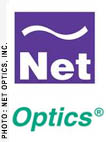Leaked documents show capabilities of new surveillance technologies
November 21, 2011 Leave a comment

Net Optics logo
By JOSEPH FITSANAKIS | intelNews.org |
A trove of hundreds of documents, obtained by participants in a secretive surveillance conference, displays in unprecedented detail the extent of monitoring technologies used by governments around the world. The Wall Street Journal, which obtained the leaked documents, says they number in the hundreds; they were reportedly authored by 36 different private companies that specialize in supplying government agencies with the latest surveillance hardware and software. They were among dozens of vendors that participated in an unnamed conference near Washington, DC, in October, which attracted interested buyers from numerous government agencies in America and beyond. The Journal, which has uploaded scanned copies of the leaked documents, says that many include descriptions of computer hacking tools. The latter enable government agencies to break into targeted computers and access data stored in hard drives, as well as log keystrokes by the targeted computers’ users. Other applications target cellular telecommunications, especially the latest models of so-called ‘smartphones’; one vendor in particular, Vupen Security, gave a presentation at the conference, which describes how its products allow for electronic surveillance of cell phones by exploiting security holes unknown to manufacturers. Some of the most popular products at the conference related to what the industry calls “massive intercept” monitoring, namely large-scale software systems designed to siphon vast amounts of telephonic or email communications data, or to capture all Internet exchanges taking place within a country’s computer network. One conference participant, California-based Net Optics Inc., bragged in its presentation about having enabled “a major mobile operator in China” to conduct “real-time monitoring” of all cell phone [and] Internet content on its network. The stated goal of the surveillance was to “analyze criminal activity” and “detect and filter undesirable content”. Earlier this month, intelNews relayed news reports of Italian and French companies helping equip Syrian authorities with a state-of-the-art email surveillance systems able to “intercept, scan and catalog virtually every e-mail that flows through the country”. In August, we reported on allegations that German and Finnish companies, including Siemens, help the repressive government of Bahrain keep tabs on political organizing on the Internet. The same company, Siemens, was accused in 2009 of installing and maintaining the Iranian government’s telecommunications surveillance and interception system, which allows it to “examine the content of individual online communications on a massive scale”. The Journal spoke to Jerry Lucas, president of TeleStrategies Inc., which organized October’s conference; he argued that the event was “not political”: “we don’t really get into asking, ‘is this in the public interest?’”, he said.






